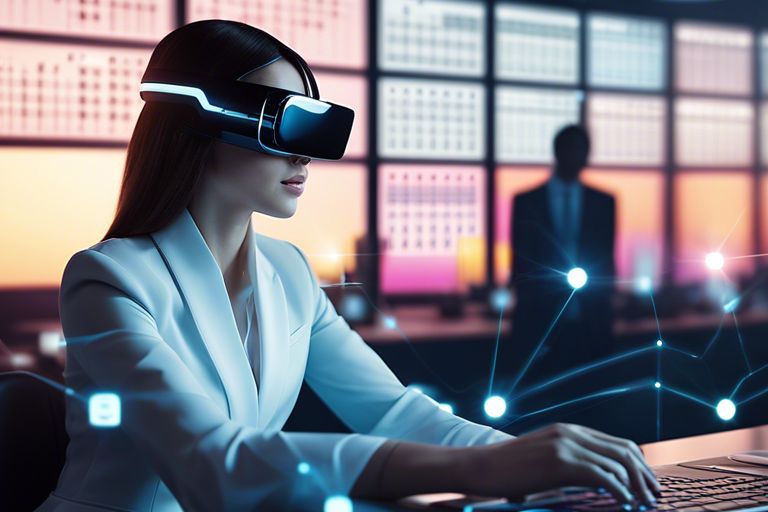It’s time to reevaluate how artificial intelligence can enhance your personal productivity. As workplaces evolve and technological advancements become prevalent, many individuals still overlook the immense potential AI tools offer in streamlining tasks and improving efficiency. From intelligent scheduling assistants to advanced analytics that inform decision-making, understanding and integrating these AI solutions into your daily routine could transform the way you work and manage your time. Explore the untapped benefits and discover if you are underestimating AI’s role in optimizing your productivity.
Key Takeaways:
- Enhanced Efficiency: AI tools can automate repetitive tasks, allowing individuals to focus on more strategic and creative endeavors.
- Data-Driven Insights: AI systems analyze vast amounts of data quickly, providing users with actionable insights that can improve decision-making.
- Personalization: AI can tailor recommendations and solutions to individual work habits and preferences, fostering a more personalized productivity experience.
- Collaboration Facilitation: AI technologies enhance teamwork by streamlining communication and coordinating schedules among team members.
- Adaptability: The ability of AI to learn and adapt improves its effectiveness over time, making it a vital partner in boosting personal productivity.
Understanding AI in Personal Productivity
To gain a thorough understanding of the role of AI in personal productivity, it is crucial to define what artificial intelligence (AI) actually entails.
Definition of AI
An appropriate definition of artificial intelligence encompasses a wide range of technologies aimed at simulating human intelligence. This includes everything from machine learning and natural language processing to computer vision and robotics. AI leverages algorithms and vast datasets to provide insights, automate tasks, and make predictions that can significantly enhance your workflow and decision-making processes.
By using AI, you can streamline repetitive tasks, analyze data faster, and even personalize your experiences in various applications. As you explore these technologies, you will find various tools designed to integrate seamlessly into your daily routines, ultimately improving your overall productivity.
Historical Context of AI in Workspaces
One of the key aspects to consider is the historical context of AI in workspaces, as it highlights how far this technology has evolved. Initially, AI applications were limited to basic automation tasks, such as simple data entry and scheduling. However, with advancements in technology, particularly in processing power and algorithm sophistication, AI began playing a more complex role in organizational productivity.
As AI technologies developed over the decades, they became more accessible to businesses and individuals alike, shifting from being an experimental endeavor to an necessary tool for efficiency. You can now leverage sophisticated AI applications in various domains, from project management to customer service, transforming how you approach your work.
To understand the current landscape, it is important to take a look at the AI technologies that are actively being utilized today. AI now encompasses a range of platforms and tools, many of which are part of the software you likely use every day. From advanced chatbots that handle customer inquiries to sophisticated algorithms that analyze big data, these technologies are designed to enhance personal productivity by simplifying tasks and providing actionable insights.
Current AI Technologies in Use
For you to maximize your productivity, you must recognize the current AI technologies that have become integral to modern workspaces. Virtual assistants like Siri, Alexa, and Google Assistant are excellent examples of how AI supports personal productivity by managing your schedule, setting reminders, and even answering your queries. Additionally, tools such as AI-driven project management software and data analytics platforms can automate workflows, track progress, and provide you with suggestions based on real-time data.
This arsenal of AI tools not only simplifies your day-to-day operations but also enables you to focus on more strategic tasks that require human creativity and problem-solving abilities. As you integrate these technologies into your workflows, you will likely notice a sharp improvement in your efficiency, allowing you to achieve your goals with less effort and higher quality.
The Benefits of AI on Personal Productivity
If you’ve ever wondered how to make the most of your time and resources, you might be surprised by the answers that artificial intelligence (AI) can provide. By integrating AI into your daily routines, you can streamline processes and amplify your productivity in ways that were previously unimaginable. From time management to decision-making, the benefits are not just theoretical; they’re actionable strategies that can elevate your personal and professional life.
Time Management Enhancements
Time is one of your most valuable assets, and effectively managing it can lead to significant improvements in your personal productivity. AI tools can analyze your daily activities and pinpoint where your time is being spent. For example, AI-driven applications can schedule your meetings, remind you of deadlines, and even suggest optimal work times based on your productivity patterns. By optimizing your calendar, you can minimize time wasted on logistical issues and maximize focus on high-priority tasks.
Moreover, AI can help you establish better work-life balance by enforcing time-blocking techniques. By setting aside designated periods for specific types of work, along with breaks, you can cultivate a more disciplined approach to your tasks. The technology can even notify you when to take breaks, ensuring you recharge and maintain your focus throughout the day. In this way, AI not only enhances your time management but also contributes to your overall well-being and efficiency.
Improved Decision-Making Processes
Any time you’re faced with a decision—large or small—AI can augment your ability to make informed choices. By harnessing the power of data analytics, AI can sift through enormous datasets to identify trends, potential outcomes, and key variables that you might overlook. This not only saves you time but also raises the quality of your decisions, allowing you to feel more confident in your choices.
Improved decision-making processes aren’t merely about processing numbers; they can also extend to personal development. With AI tools that analyze your past performance and feedback, you can gain insights into areas where you excel and where you need improvement. This level of personalization equips you to make choices that align with your goals, enhancing your ability to focus on what truly matters.
Reducing Repetitive Tasks
Improved productivity is often about eliminating the unnecessary, and AI excels at taking over repetitive tasks that can consume your time. Whether it’s automating email responses, managing spreadsheets, or scheduling social media posts, AI tools can handle these mundane functions so you can concentrate on strategic and creative responsibilities that require your unique expertise.
It’s important to recognize that by reducing repetitive tasks through AI, you’re not just freeing up time; you’re also enhancing your cognitive engagement. When your mind isn’t bogged down by routine chores, you can devote your mental energy to more critical and innovative pursuits. This means more room for creativity and problem-solving, both of which are imperative components of success in any field.
Challenges and Misconceptions
Your perception of artificial intelligence (AI) and its role in personal productivity may be clouded by various challenges and misconceptions. These misunderstandings can hinder your ability to effectively integrate AI tools into your daily life for enhanced efficiency. While AI holds the promise of transforming the way you work, it is crucial to clarify some common myths and concerns that surround this powerful technology.
Common Misunderstandings About AI
For many people, AI is often equated with complex autonomous systems from science fiction films, leading to a misunderstanding of its capabilities and limitations in practical applications. You might believe that AI can think or make decisions independently, which is not entirely accurate. AI is vitally a tool designed to process vast amounts of data and deliver insights based on patterns. Its true strength lies in augmenting your intelligence rather than replacing it, allowing you to become more productive and effective in your tasks.
Furthermore, you may have the misconception that adopting AI is exclusively for large corporations or tech-savvy individuals. In reality, AI tools are increasingly accessible, with numerous user-friendly applications designed for everyday use. They can assist with tasks like scheduling, email management, and data analysis, enabling you to save time and focus on more strategic aspects of your work.
Ethical Considerations
One significant concern surrounding AI is the ethical implications of its usage. As AI systems become more integrated into our daily lives, you may find yourself questioning how data is collected, used, and safeguarded. Transparency in AI algorithms and the potential for bias in decision-making processes are vital topics to consider as you navigate the technology landscape. Furthermore, the implications of AI on privacy and consumer rights must not be overlooked, making it imperative for you to stay informed and engaged in discussions surrounding these issues.
Challenges arising from ethical considerations are particularly relevant in the context of increasing reliance on AI. With complex algorithms often driving critical business decisions, the potential for error or bias raises questions about accountability and fairness. You have a responsibility to advocate for ethical AI practices that respect human dignity and promote social equity, ensuring that the benefits of AI are shared responsibly across all demographics.
Potential Job Displacement Concerns
Misconceptions about AI often extend to fears regarding job displacement. Many individuals worry that the widespread adoption of AI technologies will render human roles obsolete. However, it’s vital to recognize that while AI can automate certain repetitive tasks, it is far more likely to augment your capabilities rather than replace you entirely. You should view AI as a collaborator that can take on mundane tasks, freeing up your time for more complex and creative endeavors that require human intuition and empathy.
This misconception about job loss often stems from a lack of understanding about the evolving nature of work. As AI continues to enhance personal productivity, new roles will emerge that demand a combination of technical and interpersonal skills. You can leverage AI to improve your competencies, becoming more valuable in an ever-changing job market that prioritizes innovation and adaptability.
Future Implications of AI in Personal Productivity
Now, as we look toward the future, the potential implications of artificial intelligence in personal productivity are both exciting and profound. The enhancements driven by AI could redefine not only how you approach your tasks but also how you manage your time and prioritize your goals. With ongoing advancements, it’s crucial to consider how these changes can be integrated into your daily life for maximum productivity and efficiency.
Predictions for AI Developments
Predictions regarding AI developments suggest that tools and applications will become increasingly sophisticated, enabling you to automate mundane tasks, streamline workflows, and even predict your productivity patterns. Imagine AI systems that can analyze your work habits and provide real-time feedback on how to optimize your schedule to improve focus and performance. This level of functionality could vastly reduce time spent on planning and allow you to focus more on imperative tasks that require your creative input.
Moreover, you can expect AI assistants to evolve into proactive partners in your work life. Instead of merely reacting to your commands, these intelligent systems may anticipate your needs, reminding you of deadlines, suggesting priorities, or generating reports on your progress. This shift from reactive to proactive AI could empower you to make better-informed decisions, increase your productivity, and ultimately enhance your overall work-life balance.
Integrating AI into Daily Routines
Future AI advancements will greatly affect how you integrate these technologies into your daily routines. By adopting AI-driven tools, you can customize your work environment, making it more conducive to your specific productivity requirements. Whether through automated scheduling, AI-enhanced note-taking apps, or smart reminders that adapt to your habits, these technologies stand to significantly enhance the way you tackle your day-to-day tasks.
Implications of these integrations extend beyond simply getting work done faster. As you master the use of AI tools, you’ll find yourself in a better position to manage stress, reduce fatigue, and reclaim valuable hours in your day. This could lead to a more balanced life, allowing you to indulge in passions and interests you may have previously neglected due to time constraints.
Evolving Skill Sets for the Workforce
Predictions also indicate that as AI continues to permeate the workplace, the skill sets required for success will evolve dramatically. You might need to shift your focus from traditional skill acquisition toward a more nuanced understanding of how to effectively interact with AI systems. This includes not only being able to leverage these tools for efficiency but also understanding their limitations and ethical implications. Adapting to this new landscape will be imperative for maintaining a competitive edge in your career.
Developments in educational and professional training programs are likely to reflect this shift. You may find that programs emphasizing AI literacy, data analysis, and algorithmic thinking will become crucial in equipping you with the tools necessary to thrive in an increasingly automated world. Employers may place higher value on your ability to collaborate with AI technologies, setting the stage for a workforce that is adept in a variety of interdisciplinary skills. By embracing this change, you can position yourself not just as a follower of AI developments, but as a leader who actively contributes to its evolution.
To wrap up
Hence, it is crucial for you to acknowledge the transformative impact of AI on your personal productivity. The tools and applications powered by artificial intelligence can streamline your daily tasks, enhance your decision-making processes, and ultimately unlock your full potential. By integrating AI-driven solutions into your workflow, you stand to gain not only efficiency but also a better balance between your professional and personal life. With these advancements at your fingertips, the question is not whether AI can help you, but rather how you can best leverage it to improve your workflow and outcomes.
As you explore the possibilities that AI presents, consider the ways it can serve as an invaluable ally in your pursuit of personal and professional success. By staying informed about emerging trends and technologies, you can ensure that you’re not left behind in a rapidly evolving landscape. Embracing AI is more than just a technological shift; it’s a strategic decision that can enhance your productivity and propel you toward your goals. Don’t underestimate the role of AI—it’s a critical component in elevating your overall effectiveness and efficiency in today’s fast-paced environment.




